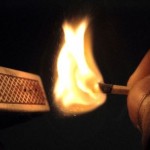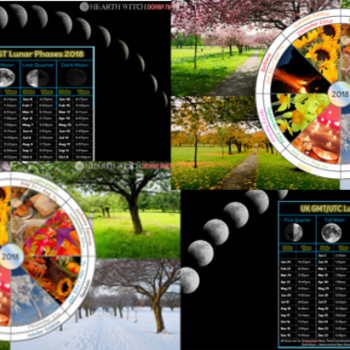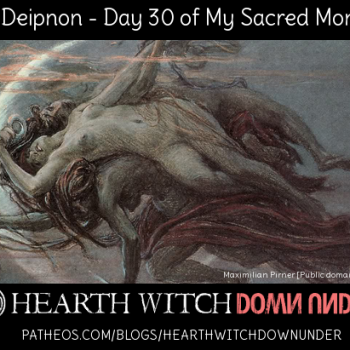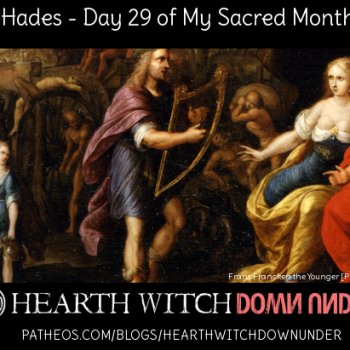Hail Hekate, She of the innumerable festivals…. Apparently. I am sure it’s not unique to Hekatean practice, but I tend to notice it more with Hekate than anyone else – the bevy of festivals She has that are ancient, maybe, apparently, so they say.
Now I have written on Hekates festivals before as part of the 30 Days of Devotion project back in August, but because I was writing about all of Her sacred days and times, I wasn’t able to go into too much detail about each specific one – and if you look at the link you will see, I knew basically nothing about the November festivals anyway. But it’s November and this week, on the 16th, we had the ancient festival called Hekates Night. And at the end of this month, the 30th for those who can’t remember how many days in a month, we have Hekates Day of the Crossroads, or some variation of that name. Also an ancient festival of course.
Except for the part where neither of them actually appear to be ancient. So, my mission this week was to trace these two festivals and find out, 1: what they are about, 2: are they ancient, and 3: where did they come from if they aren’t ancient.
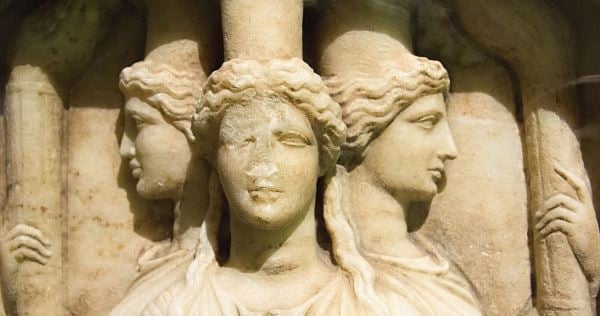
Hekates Night
November 16th every year.
If you are going to celebrate any festival of Hekate, make sure it is this one above all! This is the night that Hekate roams the earth. This is the night Hekate leads the wild hunt. This is the night we must leave an offering at the crossroads for Hekate and the dead, once you leave the offering walk away and do not look back – if you look back you will be driven mad by the dead. You also cannot retrieve the plate you leave the offering on so make sure it isn’t expensive! In ancient Greece people would sacrifice animals to Hekate on this night. Other than sacrifice, traditional offerings for this night include – eggs, fish, garlic, honey, cakes.
These are the things I have read that explain this particular festival. Other than the part where Hekate leads the wild hunt, everything is repeated on every site that I looked at. There are no sources, except ones that lead to other websites, including ones that no longer exist – so that’s helpful.
I tried to trace this one, but I got nowhere. I looked at some Greek festival calendars, which are luni-solar and the equivalent Gregorian dates change each year, so I checked for festivals in October, November and December. Couldn’t find anything that would match. I even looked at a few Roman ones and couldn’t find a likely similar festival. I had discussions about it on Facebook with other Hekateans, including people like Sorita D’Este who has certainly done way more research into Hekate than I have and the consensus always came down to – no, this is a modern festival.
Sorita has some ideas on where/how this festival began, what it may have been inspired by – and she will share those in her upcoming book Circle for Hekate, which will be released on the first new moon of January next year, so I won’t mention those ideas. My own idea in the end though was when I realised just how many times I read about the offerings needing to be made at the crossroads, what offerings to make and the other rules that go with it. And some sites refer to this festival as, literally, The Night of Hekates Supper.
It sounds exactly like the Deipnon. It’s possible that one year someone wrote about the Deipnon (aka Hekates Supper) happening on the 16th of November and they forgot to mention that the next Deipnon would be on the next dark moon, not on the same date next year. And so, the 16th of November became the annual night of Hekates Supper.
Possible, not definite – and we have no way of knowing either way. The possibilities of where this festival came from are numerous really – and the possibility does exist that it really is an ancient festival, but we no longer have access to the records to source it.
I should also mention one other thing I found, one time only. There is a feast to Saint Hilda on the 17th of November, and according to this site she is made up from several Goddesses, including Hekate.
As a note, dark moon (astronomical new moon), November 16th, 2009. There was also a dark moon on November 15th in 2001, but some moon phase calendars show it as being November 16th, so who knows what moon calendars actually said back then! 1990 had a dark moon on November 17th, which being called the new moon in astronomy may have had some lunar calendars calling November 16th the dark moon. Lunar calendars are confusing things sometimes.
Hekate-Trivia Day of the Crossroads
November 30th each year.
This day is sacred to Hekate-Trivia, it is the day of the crossroads.
That’s it, that is all I can find on this festival. There is no mention, at all, about what one is meant to do on this festival, what was done “in ancient times” – nothing. At all. All this festival ever includes beyond the name and date is information about Hekate and Trivia, or about Hekate and what the word ‘trivia’ means (it’s ‘three ways’ just so you know). It’s the oddest one of all of Hekates supposed festivals. I did search for historical reference anyway.
While I can find nothing to do with the modern festival I did find one curiosity that is ancient, and yet it is difficult. There was an ancient Roman festival called Compitalia, which was in honour of the Lares Compitales, who are household deities of the crossroads. The reason this one is difficult is because it was celebrated in late December or early January – but it was also once a movable festival (it changed dates) before becoming fixed in January. Whether it was so movable as to be in November, I cannot say. Also, neither Hekate nor Trivia are really mentioned for this festival by most sources – some do mention Her, but most do not.
Still, it might be something some people may like to look at. Hekate is a crossroads Goddess after all, so while the dates may be off, it might be this festival can help some with inspiration on what they might like to incorporate into the modern November festival. Just as a note, the Compitalia was said to, at times, bear some similarities to Saturnalia.
I have a headache. Trying to find information for the November 30th festival was like slamming my head into a brick wall, repeatedly. I got nowhere fast, and then slowly kept going nowhere. For this one I have to say this – not only do I believe this is not an ancient festival, I don’t think it even counts as a modern festival. It is just a date that has a name attached to it! There is literally nothing about this festival beyond the name, so how can it be a festival at all?
Conclusion
I really do have a headache. At the same time though, I do find this sort of search kind of thrilling, it’s a mystery, I am Hekatean and Hekate is all about mysteries! Of course I love this, headaches notwithstanding.
In one of the discussions I was part of on Facebook, a question was asked that I find especially important, basically, “Does it even matter? Does a festival not being ancient somehow devalue it?” Yeh, this is a good question, and it needs to be answered.
It both does and doesn’t matter, but no it doesn’t devalue the festival. In my personal opinion, a modern festival can be just as good, sometimes even better, than an ancient one – modern ones can be created to fit better with our modern lives and modern world. There are some modern festivals that are wonderful, including Hekatean ones like the Rite of Her Sacred Fires. So, in this way, no it doesn’t matter if it is ancient or modern – a festival is a festival and has as much meaning as the participants place upon it – and of course as the deity accepts from it.
But it does matter in one important way – truth. The thing about modern festivals like The Rite of Her Sacred Fires is that they are modern, they are openly brand new and shiny (well, about a decade old, but that’s new comparatively speaking). They don’t pretend to be ancient, people are not trying to justify the existence of such a festival by lying about it and calling it ancient when it isn’t. No, being modern doesn’t devalue a festival – but a lie kind of does. So in this way, yes the modern festivals, such as these November ones are slightly less valuable than truly ancient festivals because of the lies and misconceptions around them. But their lack has nothing to do with their age.
Of course, not knowing precisely how these festivals came to exist today does mean we can’t call them lies, not really – because we don’t know that they are. As I said above, it is possible for the November 16th festival to have begun because of confusion between the luni-solar Greek calendars and our Gregorian calendar. That isn’t a deliberate lie, and since this possibility, and other similar ones, exist for both festivals – we just can’t say these are definite lies.
But this isn’t the only problem with these two festivals, there is one other problem, especially with the 30th one – and that is lack of details. As I said, so sagely (and humbly), in my post back in August,
“As we can see the modern festivals are, for the most part, a bit empty and missing information. [They] don’t really give us much in the way of ideas on how to celebrate the festivals. This is the problem with just grabbing a date and giving it to a deity without some thought into what that date should mean and be about. Hekate has so many aspects to Her, that saying a day is about Her really doesn’t tell us much. Is it a light or dark festival? Is it a life or death festival? Is it magic or mundane?
So, if you’re going to create your own festival – make sure you create some details for it as well.”


